As Regan Smith Emerges for Team USA, a Reminder of Missy Franklin’s Breakthrough
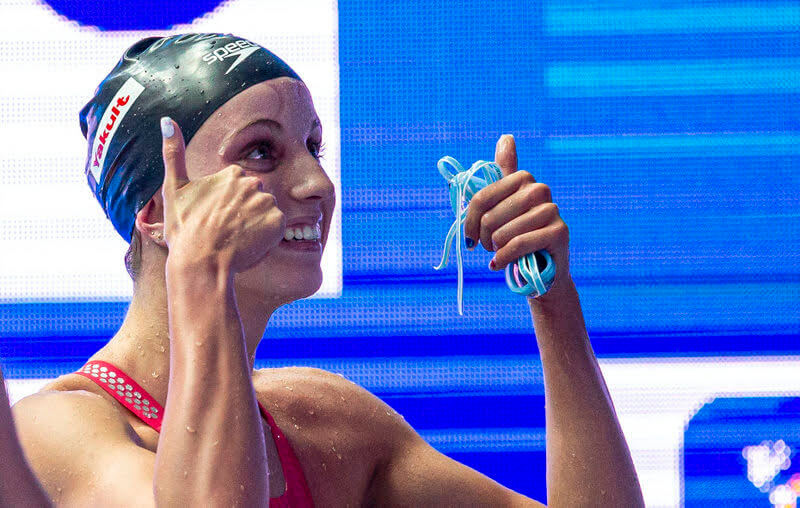
Editorial content for the 2019 World Championships coverage is sponsored by FORM Swim Goggles.
See full event coverage.
Follow FORM on Instagram at @FORMSwim #swimwithform

World Championships (Regan Smith/Team USA Review)
The scene was Shanghai, and the 2011 edition of the World Championships had just moved past their midway point. Until then, teenager Missy Franklin – at least on the worldwide stage – was more anonymous than known. Although she had captured a bronze medal in the 50 backstroke earlier in the meet, the big bomb had not yet been dropped.
Then, in the course of 1:55.06, everything changed. That’s the amount of time it took Franklin, a rising commodity in United States circles, to announce to the world: I’m here. That time posted by Franklin, who raced at the Pan Pacific Championships the prior summer, came on the front of the United States 800 free relay and prompted teammate Katie Hoff, set to handle the third leg of the relay, to ask, “Did she just do that?” Two days later, Franklin was the world champion in the 200 backstroke and a tidal wave of momentum had been produced, a tsunami that led her to a five-medal showing and backstroke sweep at the 2012 Olympic Games in London.
Why the discussion of Franklin? Well, this past week in Gwangju, American teenager Regan Smith traveled a similar road. Like Franklin, she has been a known entity in the U.S., pegged as a future star for Team USA. But until she unleashed a superb performance for the globe to see, she was able to race in the shadows.
No more.
At the 18th edition of the World Championships, Smith took advantage of her two events, coming away from the Nambu University Aquatics Center with three world records. There was her other-worldly effort in the 200 backstroke, in which her semifinal clocking of 2:03.35 took down Franklin’s seven-year-old world record. For an encore, Smith led off the American gold-medal winning 400 medley relay in a world record of 57.57, the relay also setting a global standard of 3:50.40.
“After what I did in the 200 back, I was feeling really confident and really excited, and I had a really good feeling going in,” Smith said of the medley relay. “I was super, super happy when I finished.”
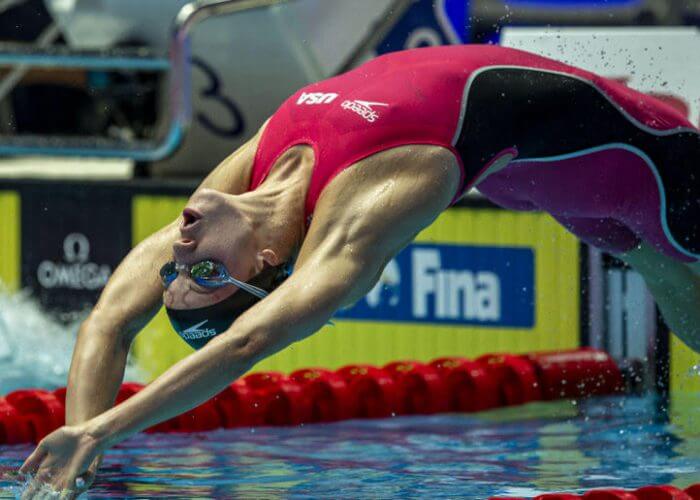
Photo Courtesy: PATRICK B. KRAEMER
Like Franklin almost a decade before, Smith will enter the Olympic year as one of the most-watched athletes in her sport. She is undoubtedly the favorite in both backstrokes heading to the 2020 Games in Tokyo, as was Franklin for London, and there is a good possibility that Smith’s schedule will feature a few additional events, such is her versatility. It’s more than likely that NBC will have plenty of cameras and features on Smith ready to roll.
Smith is expected to contest several events at this week’s United States Nationals at Stanford University, and the times she drops in the 100 butterfly and 200 butterfly, along with the 200 freestyle, will provide a gauge as to what she’ll be capable of at the U.S. Trials in Omaha next June. Of course, there is also reason to view Smith’s results with a fine eye, given the fact that Worlds is a physically and emotionally draining competition and jetlag and time adjustment will be factors.
What is certain is Smith’s status as the United States’ next aquatic prodigy.
“I was telling her before we went out, I am mad I’m swimming breaststroke because I wanted to see her split,” Lilly King joked about following Smith on the medley relay. “There’s nothing better than diving in a body length ahead already. I’m super proud of (Smith) and seeing what she is able to accomplish.”
A Need to Regroup
Of the 27 medals collected by the United States in Korea, 15 of those podium positions went to American women, with 10 to the men and two for mixed-relay efforts. Meanwhile, eight of the 14 gold medals were earned by U.S. females, with five for the men and one from a mixed relay. For the men, there is no doubt that Caeleb Dressel’s four individual gold medals masked a subpar week that has left a distaste in the mouths of several athletes.
“As we close out tonight, the clock starts for Tokyo and I think our athletes understand that,” said men’s Olympic coach Dave Durden. “Some athletes are carrying good confidence and some athletes are carrying experiences that will fuel and inspire them for the next 12 months. We’re excited to take the results and experience and make subtle changes that will get our athletes in the best spots to perform well for Team USA.”
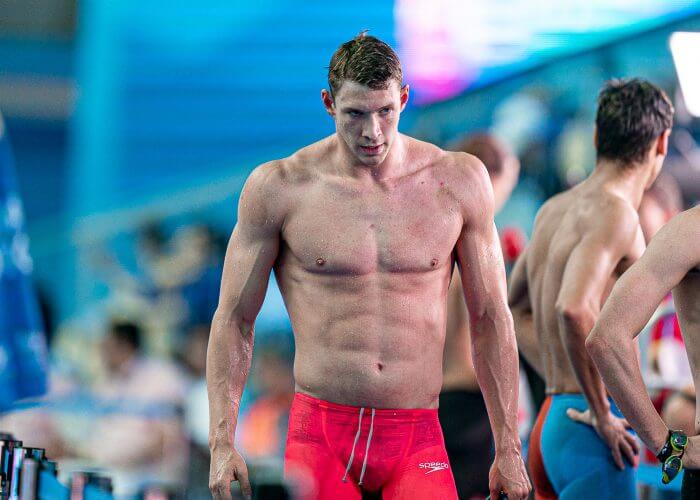
Photo Courtesy: Becca Wyant
Heading into Worlds, three-time Olympic champion Ryan Murphy suggested that his attention during the quadrennial has been geared toward peaking in Tokyo. Still, Murphy had a hard time digesting what unfolded in Gwangju. While he earned a silver medal in the 200 backstroke, Murphy missed the podium in the 50 and 100 backstrokes and turned in an effort on the leadoff of the 400 medley relay that was a second slower than his world record.
There were other letdowns, too, including Chase Kalisz failing to advance to the final of the 400 individual medley, where he was the defending champion. More, the U.S. did not place anyone in the final of the 200 freestyle, 800 freestyle and 1500 freestyle. Although Andrew Wilson came through with career bests in the 100 and 200 breaststrokes, that discipline is in need of a boost, along with the 200 butterfly, which is on the way via youngster Luca Urlando.
On the positive side, Blake Pieroni rose to the occasion and just missed a medal in the 100 freestyle, where he finished fourth. Meanwhile, coming off the World University Games, Zach Apple was a key cog of the victorious 400 free relay, where he contributed a sub-47 split on the third leg. Finally, Jay Litherland came through with a career-best mark of 4:09.22 for the silver medal in the 400 individual medley.
“I think overall there is room for improvement,” Murphy said. “A lot of people are ticked off and motivated for the next year. I’m disappointed with my personal performances. I put that silver medal (in the medley relay) on me. I’m going to be better next year, and that’s the theme for a lot of guys. We want to be the best team in the world in 2020, and we don’t want tit to be close.”
A Deceiving 1-for-3
The final ledger from Worlds indicated the United States won only one of the three women’s relays, Australia claiming the gold medal in a pair of team events. However, a look at the times delivered Team USA proves that the U.S. was sharp.
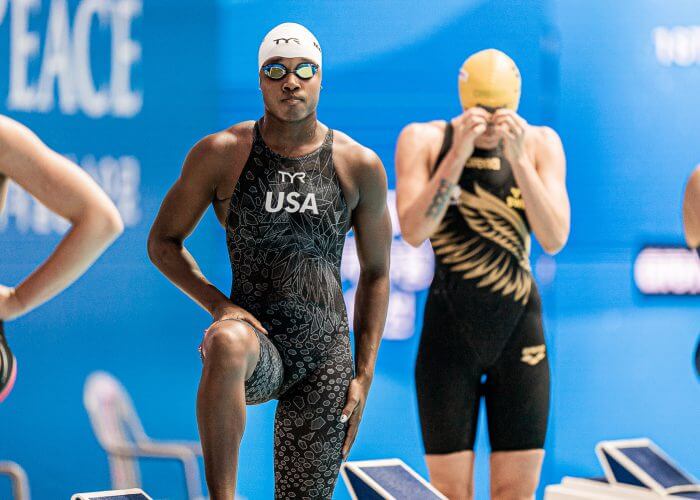
Photo Courtesy:
On top of capping the week with a world record in the medley relay, the United States established a pair of American records in the freestyle relays. The quartet of Mallory Comerford, Abbey Weitzeil, Kelsi Dahlia and Simone Manuel posted an American standard of 3:31.02 in the 400 freestyle relay while the 800 free relay of Manuel, Katie Ledecky, Melanie Margalis and Katie McLaughlin checked in at 7:41.87, which was under the previous world record. The problem was Australia went 7:41.50 for gold.
Manuel was nothing short of phenomenal throughout the week, as she swept the sprint freestyles despite not being the top seed entering the final of either stroke. With her relay contributions, Manuel became the first female in history to win seven medals at a single World Championships. She also raised her career total to 16 medals at the World Champs.
“I think it’s pretty evident that we didn’t start on the best note, but we did have a great meet,” Manuel said. “I think that’s getting a little lost because we had amazing swims. People got best times and even if they missed the podium, at the end of the day we always wanted to represent our country as best as we can.”
The Michael Andrew Story
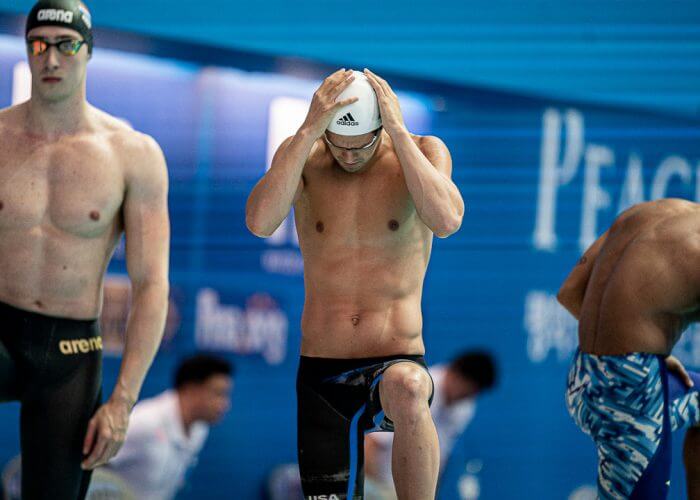
Photo Courtesy: Becca Wyant
There was some celebration of Michael Andrew becoming the first athlete in World Champs history to qualify for all four finals of the 50-meter events. But only one of those events is on the Olympic slate, and for Andrew to etch himself as a go-to performer for Team USA, he needs to excel in the events that are most coveted.
In addition to the 50 free, where Andrew was fifth in Gwangju, he has the potential to qualify for the Tokyo Games in the 100 butterfly, 100 backstroke and 200 individual medley. It will be interesting to see if Andrew places greater emphasis on those events, and less on the one-lap sprints, as he prepares for Trials.
Not to be Overlooked
One of the athletes who probably didn’t receive the credit she deserved at the World Championships was Melanie Margalis. The University of Georgia product and Team USA staple just missed the podium in the 200 individual medley, finishing fourth in 2:08.91. Margalis also split 1:55.81 on the 800 free relay and was 1:06.40 on the breaststroke leg in the prelims of the 400 medley relay.
Also overlooked was Katie McLaughlin, who just missed the final of the 100 butterfly after going 57.23 in the semifinals, but came back to anchor the 800 free relay in 1:55.36.
.jpg)

- 2017 WORLD CHAMPIONSHIPS
- OFFICIAL MEET PAGE
- WATCH RACE VIDEOS
- LIVE STREAM
- DAY 1 SWIMMING RESULTS
- DAY 2 SWIMMING RESULTS
- DAY 3 SWIMMING RESULTS
- DAY 4 SWIMMING RESULTS
- DAY 5 SWIMMING REULTS
- DAY 6 SWIMMING RESULTS
- DAY 7 SWIMMING RESULTS
- DAY 8 SWIMMING RESULTS
- RESULTS FOR ALL AQUATIC SPORTS
- DAY 8 PRELIMS HEAT SHEETS
- DAY 8 FINALS START LISTS
- FORM Swim for Coaches
- FORM Swim Sponsorships
- FORM Swim Contests
- FORM Swim Media




Great seeing her swim